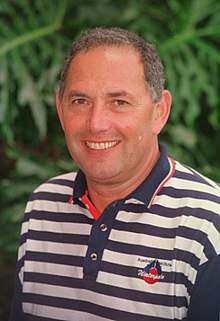István Görgényi
István Görgényi (born 2 November 1946) is a Hungarian former water polo player who won a silver medal at the 1972 Summer Olympics and coached the Australian women's national water polo team to the gold medal at the 2000 Sydney Olympics.[1]
| Olympic medal record | ||
|---|---|---|
| Men's Water polo | ||
| Representing | ||
| 1972 Munich | Team competition | |
Playing career
Gorgenyi represented Hungary as a player 96 times and was a member of teams that won the silver medal at 1972 Munich Olympics, won the gold medal at the 1973 World Championships, the silver medal at the 1975 World Championships and won the gold medal at the 1974 European Water Polo Championship.[2] He retired at 36 and took up coaching 18 months later.[3]
Coaching career

From 1984 to 1990, he was Head Coach of Ujpest TE Sporting Club in the Hungarian National League from 1984 to 1990. Results during this period were: first in 1986, second in 1989 and third in 1987 and semi-finalist in 1986 European Cup of Champions.[2] From 1991 to 1994, he was Head Coach of CACEL Nice Water Polo Club in the French National League in 1991. Results during this period were: first in 1992, 1993, 1994 and second in 1991.[2]
Gorgenyi was appointed head coach of its Victorian Intensive Training Centre in 1994 and national development coach in 1996.[3] [2] He became national junior coach in 1997. On 1 June 1998, Gorgenyi, was appointed Australian women's national water polo team Head Coach and the inaugural Australian Institute of Sport women's water polo program Head Coach.[2] Gorgenyi coached the Australian team to win the inaugural women's water polo gold medal at the 2000 Sydney Olympics. Gorgenyi retired in December 2004 and was replaced by Greg McFadden as National Head Coach and AIS Head Coach in January 2005.[4]
Major results of the Australian team during his period as Head Coach of the Australian team:
FINA World Cup
In 2005, Gorgenyi set up a consultancy to promote his 'Hunting Territory ' philosophy - "a form of behaviour by which a player or more commonly a small group of players form ownerships of parts of the team process, often subconsciously, and, disdaining the broad collective interest, ultimately cause it to break down."[5]
References
- Evans, Hilary; Gjerde, Arild; Heijmans, Jeroen; Mallon, Bill; et al. "István Görgényi". Olympics at Sports-Reference.com. Sports Reference LLC. Archived from the original on 18 December 2012. Retrieved 15 May 2012.
- "Water Polo at the Australian Institute of Sport". Pandora Archive - Australian Sports Commission. Archived from the original on 19 January 2000. Retrieved 26 September 2017.CS1 maint: BOT: original-url status unknown (link)
- "Australian coaches reveal their secrets". Sports Coach: 3–8. Winter 2000.
- Annual Report 2004/05 - Australian Water Polo. Sydney: Australian Water Polo. 2005.
- Murray, Les. "Ange cracks through the 'Hunting Territory'". SBS World Game. Retrieved 26 September 2017.